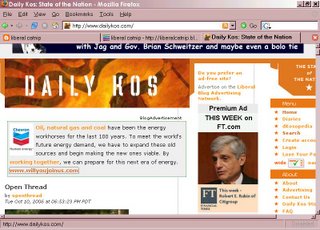
Yes, that was an ad for Chevron. Chevron. On Daily Kos.
It was there one minute and now it's gone.
There was
quite the little discussion about that Chevron ad, including the infamous 'Start your own fucking Blog' in response to the diarist's complaint about the ad being on the site and the usual defence of 'but Markos
needs the money!'.
Yes. Complain about a corporation that has committed
grievous human rights abuses and you'd better SYFPH or just buy a subscription to make those pesky dkos ads disappear because the biggest so-called
progressive blog can shill for whoever the hell it wants to.
The petrochemical company Chevron is guilty of some of the worst environmental and human rights abuses in the world. From 1964 to 1992, Texaco (which transferred operations to Chevron after being bought out in 2001) unleashed a toxic "Rainforest Chernobyl" in Ecuador by leaving more than 600 unlined oil pits in pristine northern Amazon rainforest and dumping 18 billion gallons of toxic production water into rivers used for bathing water. The toxic crude oil and formation water seeped into the subsoil, contaminating surrounding freshwater and farmland. As a result, local communities have suffered severe health effects, including cancer, skin lesions, birth defects, and spontaneous abortions. Indigenous communities have been dispossessed of their lands, and millions of hectares of rainforest have been destroyed to make way for the company's pipelines and oil wells.
Chevron is also responsible for the violent repression of nonviolent opposition to oil extraction. In Nigeria, Chevron has collaborated with the Nigerian police and military who have opened fire on peaceful protestors who oppose oil extraction in the Niger Delta. In 1998, two indigenous Ilaje activists were killed by Nigerian military officers flown in by the company while protesting at an oil platform in Ondo state. In 1999, two people from Opia village were killed by military personnel paid by Chevron, after soliciting a meeting to complain about the company's harmful effects on local fishing. And in 2005, Nigerian soldiers fired upon protestors at Escravos oil terminal, leaving one protestor dead.
Additionally Chevron is responsible for widespread health problems in Richmond, California, where one of Chevron's largest refineries is located. Processing 350,000 barrels of oil a day, the Richmond refinery produces oil flares and toxic waste in the Richmond area. As a result, local residents suffer from high rates of lupus, skin rashes, rheumatic fever, liver problems, kidney problems, tumors, cancer, asthma, and eye problems.
In December 2004, the Unocal Corporation, which recently became a subsidiary of Chevron, settled a lawsuit filed by 15 Burmese villagers, in which the villagers alleged Unocal's complicity in a range of human rights violations in Burma, including rape, summary execution, torture, forced labor and forced migration. Despite the settlement, human rights abuses continue along the oil pipeline in Burma, which is still "secured" by the Burmese military. Chevron is responsible for the risks associated with this pipeline.
A proud sponsor of Daily Kos! Won't you join them?
Update: 14.11.2006 kos has
finally addressed this issue. Bottom line: controversial ads can stay.
